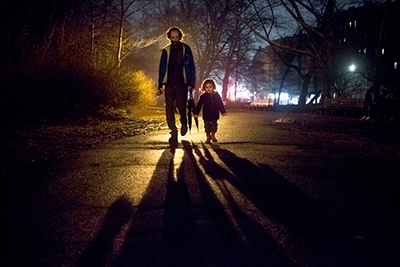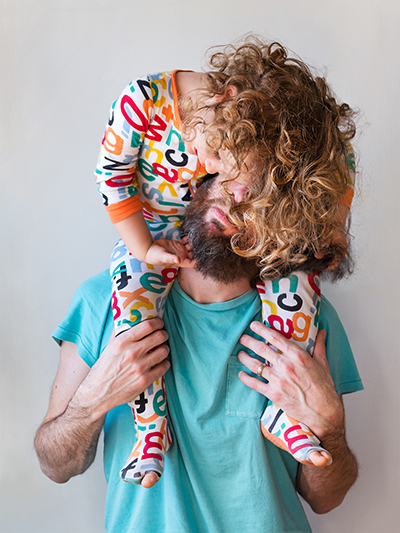JUNE: Pride

Foggy Night, 2018, 35mm Digital Photography
Melting Together, 2018, Digital Photography
By Vicky Azcoitia

Curator’s Note
by Gal Cohen
The photographs from the Pesqui and Papi series explore the relationship between a father and his little son through the eyes of the mother, the photographer. Through this reverse gender role, where the woman takes the position of observing anddocumenting the father-son relationship, these photographs invite us to rethink the paternal role in modern families and societies: Where does the concept of maternal and paternal warrant significance distinctions, and where do these line blur and lose their significance to the fluidity of parenthood? Thinking about the value pride and Father’s Day that is celebrated this month, Azcoitia intentionally captured and composed the images in ways that make their subjects fairly anonymous. In doing so, her intention is to make the photographs more universal and familiar to viewers, rather than exclusively about her husband and son — to allow viewers to extrapolate from this particular father-son relationship to others they might have or know, and think about the ever changing sensibilities of fatherhood.
About the Artist
Based in Washington Heights and the Catskills, Vicky Azcoitia is a Spanish documentary and editorial photographer with a graphic design background. Her work focuses on the natural environment and conservation advocacy. In later years, though, Azcoitia has also documented her new family. Her work has been published and exhibited internationally. She studied graphic design at the Istituto Europeo di Design in Madrid and documentary photography at the International Center of Photography in New York City, and earned a Master’s in Professional Studies in Digital Photography from the School of Visual Arts.
Pride
By Rabbi Ari Perten, Norman E. Alexander Center for Jewish Life Director
As a value, pride often exists in the extremes. Pride has the potential to both be celebrated as a statement of confidence, self-assurance, and boldness, i.e. the Pride Parade, or venerated as haughtiness, vanity, and an overinflated sense of self, i.e. pride as a deadly sin. In considering pride, we must accept both positives and negatives. Without pride, our own self-worth becomes negated. We become valueless. Essential elements of life, such as the pursuance of joy and even self-care, become distant. If I am meaningless, why should I be happy? Why should I even be clean? Simultaneously, with too much pride, we ascend Olympus, and with our new found godliness, look down at those below with hubris, understanding, albeit erroneously, that we are an inherently superior being.
The essential question is how to live with this tension? There is a traditional Jewish saying insisting that every person must have two pockets. In the right pocket are the words, “For my sake was the world created.” In the left, “I am but dust and ashes.” Recognizing the truth behind both statements offers balance. Simultaneously holding both our importance and insignificance prompts an internal reflective assessment maintaining our individual value but limiting its magnitude. When considering pride we must develop the inner conviction to assert, “I matter!” and the global view to admit, “so do others!”

